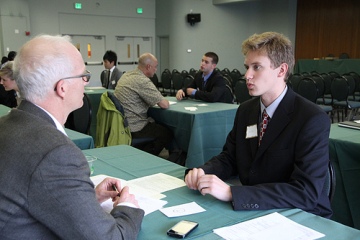Be Prepared with Interview Questions

Asking Interview Questions
A common question you’ll hear when interviewing is – “Do you have any questions for me?” You should ALWAYS have a list of interview questions prepared. If you have ever been in that situation and feel ‘stumped’ you need to change that right away! Start thinking about what is important to you and what you want to know before the interview concludes.
Also, by asking questions, you are showing your interest in the company, the role and the person who is taking time out of their day to interview you. Take this opportunity to show that you care and are curious about working at the organization. You will learn a lot and they’ll get a better understanding of what’s important to you.
Whether you are interviewing with an executive, your potential new manager, or a possible co-worker/team member – you must be prepared with appropriate interview questions.
Below is a list of great questions to memorize or bring with you when interviewing. No company is perfect so by asking the candid questions, you’ll get a better understanding of the challenges that you might face if you do join the organization.
Review these questions and ask them in your own way. You want to come across as genuine – so ask questions in your own words. Always be truthful and remember job searching basics.
Big Picture Interview Questions (Ask the Executive/VP level):
- What is your company’s long term vision for its products/services?
- What divisions are getting the most investment right now (dollars, people, expansion, etc)?
- What is the focus – to grow fast or become profitable?
- What is company’s plan for attracting and retaining a diverse team?
Interview Questions Specific to the Position (Ask the Hiring Manager):
- What are the 2-3 traits that the ideal candidate must have?
- Are there any concerns about my background that I can help alleviate?
- What are the 1-2 challenges that you think this role needs to be prepared for?
- What is the team structure and how does this role fit in?
Individual Focused Interview Questions (Ask the Team Member):
- Why do you love working here? What do you think could be improved?
- What surprised you most when you started working here?
- What is your biggest accomplishment here?
- How would you describe the company culture?
- When you were a kid, what did you want to be when you grew up?
There are also questions that you should not ask. The main rule is don’t ask questions that you can find answers to on the Internet. Take a look at this guide on questions to avoid asking.
Photo Credit: © Can Stock Photo / photography33













